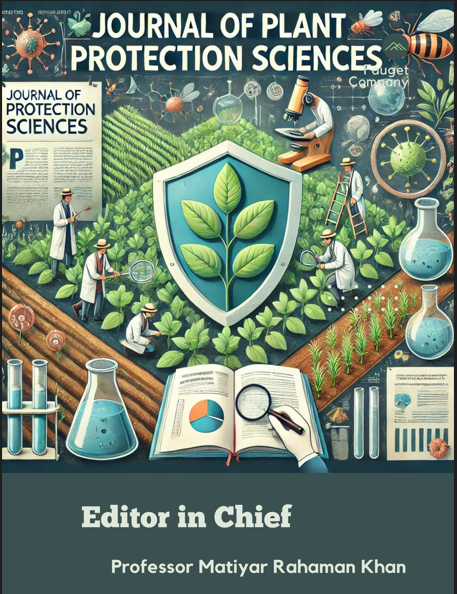Control strategies of papaya mealybug, Paracoccus marginatus Williams & Willink infesting vegetable crops in Bangladesh
DOI:
https://doi.org/10.48165/Keywords:
Papaya mealybug, Paracoccus marginatus, control measures, bio-pesticide use, vegetable crops,BangladeshAbstract
The papaya mealybug, Paracoccus marginatus (Williams & Willink) colonize the ventral surface of the papaya leaves along the veins and later disperse to the unripe fruits rendering them unmarketable and inedible. The damage appeared to be in the range between 70 and 95 per cent. Generally young plants die due to heavy infestation and colony formation of the mealybug. P. marginatus is a polyphagous pest attacking several agricultural, horticultural crops, ornamental plants and weeds of economic value. The papaya mealybug feeds on the sap of the plants by inserting its stylets into the epidermis of the leaf as well as into the fruit and stem. In doing so, it injects a toxic substance into the leaves. The result is chlorosis, plant stunting, leaf deformation, early dropping of the leaves and fruits, a heavy accumulation of honeydew and death of the host plants. Heavy infestation is capable of making fruits inedible due to the deposition of thick white waxy material by this mealybug. Five biopesticides i.e., tobacco medicine (100 %), tobacco leaf extract (20 % ), mehgoni seed oil (5 % ), castor seed oil (5 % ) and neem seed oil (5 % ) were used to assess their effects on the mortality of P. marginatus . It is evident that tobacco medicine exerted the best result in terms of control followed by neem seed oil, mehgoni seed oil, castor seed oil and tobacco leaf extract (20 % ).
References
Alison, W., Marjorie, H., & Meyerdirk, D.E. (2003). Monitoring and scouting are needed to detect the early presence of the mealybug Paracoccus marginatus Williams and Granara de Willink (Insecta: Hemiptera: Pseudococcidae). Department of Entomology and Nematology, Institute of Food and Agricultural Sciences, University of Florida.
Anonymous. (1999). Control of the papaya mealybug, Paracoccus marginatus (Homoptera: Pseudococcidae). U.S. Department of Agriculture, Animal and Plant Health Inspection Service, Environmental Assessment, October 1999. Riverdale, MD.
Anonymous. (2003). Papaya mealybug, Paracoccus marginatus, in Palau. Pest Alert Plant Protection Service, Secretariat of the Pacific Community, Fiji, No. 31, 1p.
Meyerdrik, D.E., & Kauffman, W.C. (2001). Status on the development of a biological control program for Paracoccus marginatus Williams, Papaya mealybug. Internal USDA, APHIS, PPQ Report.
Meyerdrik, D.E. (1999). Control of papaya mealybug, Paracoccus marginatus (Homoptera: Pseudococcidae). Environmental Assessment, USDA, APHIS, PPQ, 20 pp.
Meyerdrik, D.E. (2004). Biological control of papaya mealybug, Paracoccus marginatus (Homoptera: Pseudococcidae) in the Republic of Guam. Plant Quarterly, 19, 110-14.
Muniappan, R.D.E., Meyerdirk, F.M., Sengebau, D.D., Berringer, Reddy, G.V.P. (2006). Classical biological control of the papaya mea

